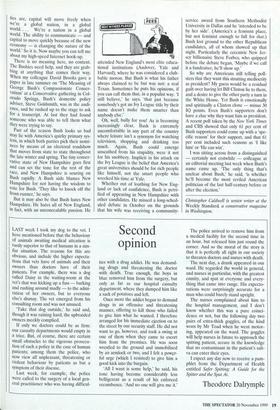Second opinion
LAST week I took my dog to the vet. I have mentioned before that the behaviour of animals awaiting medical attention is vastly superior to that of humans in a sim- ilar situation. The reasons for this are obvious, and include the higher expecta- tions that vets have of animals and their owners than doctors have of their patients. For example, there was a dog called Daisy in the waiting-room at the vet's that was kicking up a fuss — barking and rushing around madly — to the admi- ration of her owners, but to everyone else's dismay. The vet emerged from his consulting room and was not amused.
'Take that dog outside,' he said and, though it was raining hard, the upbraided owners meekly complied.
If only we doctors could be as firm: our casualty departments would empty in a trice. But, of course, there are certain small obstacles to the vigorous prosecu- tion of such a policy in the case of human patients; among them the police, who now view all unpleasant, threatening or violent behaviour by patients as but a sYmptoin of their disease.
Last week, for example, the police were called to the surgery of a local gen- eral practitioner who was having difficul- ties with a drug addict. He was demand- ing drugs and threatening the doctor with death. True enough, the boys in blue removed him from the surgery, but only as far as our hospital casualty department, where they dumped him like a sack of potatoes and left.
Once more the addict began to demand drugs in an offensive and threatening manner, offering to kill those who failed to give him what he wanted. I therefore arranged for his immediate ejection on to the street by our security staff. He did not want to go, however, and took a swing at one of them when they came to escort him from the premises. He was soon wrestled to the ground and immobilised by an armlock or two, and I felt a power- ful urge (which I resisted) to give him a good kick into the bargain.
'All I want is some help,' he said, his tone having become considerably less belligerent as a result of his enforced recumbence. `And no one will give me it.' The police arrived to remove him from a medical facility for the second time in an hour, but released him just round the corner. And so the moral of the story is that it is perfectly all right in our society to threaten doctors and nurses with death.
The next day, a drunk appeared in our ward. He regarded the world in general, and nurses in particular, with the greatest enmity, and spat at everyone and every- thing that came into range. His expecto- rations were surprisingly accurate for a man who could barely stand upright.
The nurses complained about him to the hospital management, and I don't know whether this was a pure coinci- dence or not, but the following day two pairs of extra-thick goggles, of the kind worn by Mr Toad when he went motor- ing, appeared on the ward. The goggles will help nurses in future to approach the spitting patient, secure in the knowledge that no contaminant in the patient's sali- va can enter their eyes.
I expect any day now to receive a pam- phlet from the Department of Health entitled Safer Spitting: A Guide for the Spitter and the Spat At.
Theodore Dalrymple


























































































 Previous page
Previous page